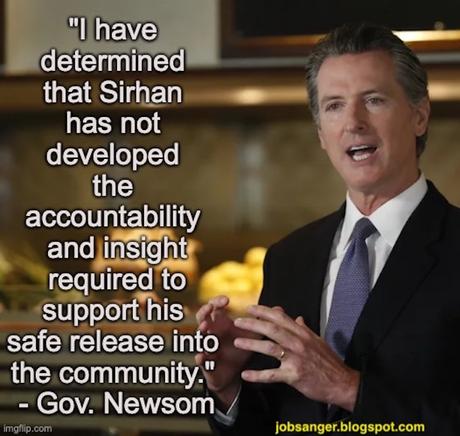
Sirhan Bishara Sirhan murdered Senator Robert Kennedy in 1968. He has now spent more than 50 years in a California prison. Recently, California's state parole board recommended Sirhan be paroled. Governor Newsom has rejected that recommendation. Sirhan will stay in prison, and likely die there.
Here is the op-ed Governor Newsom wrote for the Los Angeles Times explaining his decision:
In 1968, Sirhan Sirhan assassinated Sen. Robert F. Kennedy just moments after Kennedy won the California presidential primary. Sirhan also shot and injured five bystanders. Decades later, Sirhan refuses to accept responsibility for the crimes.
California’s Board of Parole Hearings recently found that Sirhan is suitable for parole. I disagree. After carefully reviewing the case, including records in the California State Archives, I have determined that Sirhan has not developed the accountability and insight required to support his safe release into the community. I must reverse Sirhan’s parole grant
Kennedy’s assassination not only changed the course of this nation and robbed the world of a promising young leader, it also left his 11 children without a father and his wife without a husband. Kennedy’s family bears his loss every day. Millions of Americans lost a unifier in a time of national turmoil and grief, just nine weeks after the assassination of the Rev. Martin Luther King, Jr., and four-and-a-half years after the murder of Kennedy’s brother, President John F. Kennedy.
Yet, after decades in prison, Sirhan still lacks the insight that would prevent him from making the kind of dangerous and destructive decisions he made in the past. The most glaring proof of Sirhan’s deficient insight is his shifting narrative about his assassination of Kennedy, and his current refusal to accept responsibility for it.
The evidence that Sirhan assassinated Kennedy is overwhelming and irrefutable. Before the assassination, Sirhan recorded his plans to kill Kennedy, writing, “RFK must die. RFK must be killed. Robert F. Kennedy must be assassinated.” At the time of the assassination, Sirhan accepted sole responsibility. In a televised interview, Sirhan confirmed that he assassinated Kennedy and acted alone.
Incredibly, in the 1990s, Sirhan began dodging responsibility. He claimed he could not remember the crime, then stated he was innocent. In 2016, Sirhan said he believed he did not kill Kennedy based on what he had read in his attorney’s legal briefs. As recently as last year, Sirhan portrayed himself as the victim, claiming he “was in the wrong spot at the wrong time.”
It is abundantly clear that, because of Sirhan’s lack of insight, his release on parole would pose a threat to public safety.
Sirhan is now 77 years old, but he remains a potent symbol of political violence. In the past, terrorists took hostages — and ultimately killed some of them — in Sirhan’s name. Despite inciting violence in the past, recently Sirhan laughingly dismissed the current relevance of his status as an ideological lightning rod. He does not understand, let alone have the skills to manage, the complex risks of his self-created notoriety. He cannot be safely released from prison because he has not mitigated his risk of fomenting further political violence.
Over the years, Sirhan and his advocates have churned false claims about Kennedy’s assassination. Each claim of Sirhan’s innocence has been investigated and disproved. These falsehoods fuel Sirhan’s denial of accountability. Their repetition also perpetrates an additional and ongoing harm by keeping open and unhealed the wound that the assassination inflicted on the Kennedy family and the American public.
Perhaps it is easier for some to accept debunked false claims than confront the difficult truth: Sirhan, one man with a gun, acting alone, inflicted grievous harm to our country.
I will not flinch from this truth. The parole cases I review each week reveal the depths of human violence and its destruction. But these cases also give me hope. They show the resilience of crime victims and survivors, as well as the transformation of incarcerated people who choose to do the difficult work to make amends for the harm they caused. They model what Robert F. Kennedy encouraged all of us to undertake when he said, “Surely we can begin to work a little harder to bind up the wounds among us and to become in our own hearts brothers and countrymen once again.”
Sirhan has much work to do. I encourage him to start by taking Kennedy’s words to heart.

